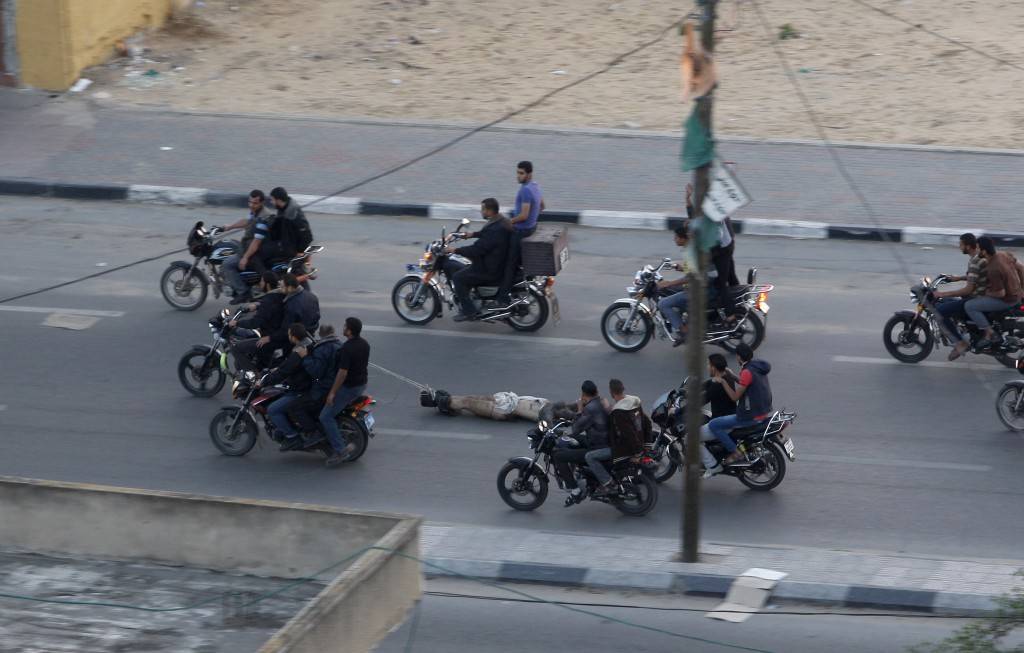There's no need for courts, international or otherwise. The laws already spelled out. Beyond that, Israel's only responsible for the hostile Arab Muslims to the point of exit. There's no requirement or obligation for Israel to establish their final destination. Lead them to the border and out they go.
As long as Israel followed the Geneva Conventions to the letter they'd be within their rights. Just like any other country.
What it boils down to is that Israel isn't responsible for or required to host, hostile foreign nationals. Just because Jordan stripped them of their citizenship doesn't mean Israel is stuck with them. The Geneva Conventions are really clear, enemy combatants may be detained and repatriated at any time.
III Geneva convention
Quote
Art 39. Every prisoner of war camp shall be put under the immediate authority of a responsible commissioned officer belonging to the regular armed forces of the Detaining Power. Such officer shall have in his possession a copy of the present Convention; he shall ensure that its provisions are known to the camp staff and the guard and shall be responsible, under the direction of his government, for its application.
End Quote
Which makes it very clear that the Geneva Conventions apply to the treatment of POWs
So who's a POW
Quote
IV Convention
End Quote
Which clearly covers hostile Arab Muslims within Israel and leads to a very interesting article
Quote
Art 7. Prisoners of war may in no circumstances renounce in part or in entirety the rights secured to them by the present Convention, and by the special agreements referred to in the foregoing Article, if such there be.
End Quote
Article 7 of the III Geneva Convention removes the right of the prisoner to renounce the laws and procedures set down in the Geneva Conventions. IE they don't get an option.
Israel may segregate combatants from non combatants
Quote
Art 19. Prisoners of war shall be evacuated, as soon as possible after their capture, to camps situated in an area far enough from the combat zone for them to be out of danger.
End Quote
And the grand finale'
Israel is only responsible for POWs up to the point of debarkation, and there is no restriction as to when a POW may be repatriated.
Quote
End Quote
Israel's legal right to detain and repatriate POWs is well established within the Geneva Conventions. Israel has only to execute its rights.
As long as Israel followed the Geneva Conventions to the letter they'd be within their rights. Just like any other country.
What it boils down to is that Israel isn't responsible for or required to host, hostile foreign nationals. Just because Jordan stripped them of their citizenship doesn't mean Israel is stuck with them. The Geneva Conventions are really clear, enemy combatants may be detained and repatriated at any time.
III Geneva convention
Quote
Art 39. Every prisoner of war camp shall be put under the immediate authority of a responsible commissioned officer belonging to the regular armed forces of the Detaining Power. Such officer shall have in his possession a copy of the present Convention; he shall ensure that its provisions are known to the camp staff and the guard and shall be responsible, under the direction of his government, for its application.
End Quote
Which makes it very clear that the Geneva Conventions apply to the treatment of POWs
So who's a POW
Quote
IV Convention
- Art. 5 Where in the territory of a Party to the conflict, the latter is satisfied that an individual protected person is definitely suspected of or engaged in activities hostile to the security of the State, such individual person shall not be entitled to claim such rights and privileges under the present Convention as would, if exercised in the favour of such individual person, be prejudicial to the security of such State.
- Where in occupied territory an individual protected person is detained as a spy or saboteur, or as a person under definite suspicion of activity hostile to the security of the Occupying Power, such person shall, in those cases where absolute military security so requires, be regarded as having forfeited rights of communication under the present Convention.
- Art 4. A. Prisoners of war, in the sense of the present Convention, are persons belonging to one of the following categories, who have fallen into the power of the enemy:
- (1) Members of the armed forces of a Party to the conflict, as well as members of militias or volunteer corps forming part of such armed forces.
- (2) Members of other militias and members of other volunteer corps, including those of organized resistance movements, belonging to a Party to the conflict and operating in or outside their own territory, even if this territory is occupied, provided that such militias or volunteer corps, including such organized resistance movements, fulfil the following conditions:
- (a) that of being commanded by a person responsible for his subordinates;
- (b) that of having a fixed distinctive sign recognizable at a distance;
- (c) that of carrying arms openly;
- (d) that of conducting their operations in accordance with the laws and customs of war.
- (3) Members of regular armed forces who profess allegiance to a government or an authority not recognized by the Detaining Power.
- (4) Persons who accompany the armed forces without actually being members thereof, such as civilian members of military aircraft crews, war correspondents, supply contractors, members of labour units or of services responsible for the welfare of the armed forces, provided that they have received authorization, from the armed forces which they accompany, who shall provide them for that purpose with an identity card similar to the annexed model.
- (5) Members of crews, including masters, pilots and apprentices, of the merchant marine and the crews of civil aircraft of the Parties to the conflict, who do not benefit by more favourable treatment under any other provisions of international law.
- (6) Inhabitants of a non-occupied territory, who on the approach of the enemy spontaneously take up arms to resist the invading forces, without having had time to form themselves into regular armed units, provided they carry arms openly and respect the laws and customs of war.
- B. The following shall likewise be treated as prisoners of war under the present Convention:
- (1) Persons belonging, or having belonged, to the armed forces of the occupied country, if the occupying Power considers it necessary by reason of such allegiance to intern them, even though it has originally liberated them while hostilities were going on outside the territory it occupies, in particular where such persons have made an unsuccessful attempt to rejoin the armed forces to which they belong and which are engaged in combat, or where they fail to comply with a summons made to them with a view to internment.
- (2) The persons belonging to one of the categories enumerated in the present Article, who have been received by neutral or non-belligerent Powers on their territory and whom these Powers are required to intern under international law, without prejudice to any more favourable treatment which these Powers may choose to give and with the exception of Articles 8, 10, 15, 30, fifth paragraph, 58-67, 92, 126 and, where diplomatic relations exist between the Parties to the conflict and the neutral or non-belligerent Power concerned, those Articles concerning the Protecting Power. Where such diplomatic relations exist, the Parties to a conflict on whom these persons depend shall be allowed to perform towards them the functions of a Protecting Power as provided in the present Convention, without prejudice to the functions which these Parties normally exercise in conformity with diplomatic and consular usage and treaties.
- C. This Article shall in no way affect the status of medical personnel and chaplains as provided for in Article 33 of the present Convention.
- Art 5. The present Convention shall apply to the persons referred to in Article 4 from the time they fall into the power of the enemy and until their final release and repatriation.
- Should any doubt arise as to whether persons, having committed a belligerent act and having fallen into the hands of the enemy, belong to any of the categories enumerated in Article 4, such persons shall enjoy the protection of the present Convention until such time as their status has been determined by a competent tribunal
End Quote
Which clearly covers hostile Arab Muslims within Israel and leads to a very interesting article
Quote
Art 7. Prisoners of war may in no circumstances renounce in part or in entirety the rights secured to them by the present Convention, and by the special agreements referred to in the foregoing Article, if such there be.
End Quote
Article 7 of the III Geneva Convention removes the right of the prisoner to renounce the laws and procedures set down in the Geneva Conventions. IE they don't get an option.
Israel may segregate combatants from non combatants
Quote
Art 19. Prisoners of war shall be evacuated, as soon as possible after their capture, to camps situated in an area far enough from the combat zone for them to be out of danger.
- Art 21. The Detaining Power may subject prisoners of war to internment. It may impose on them the obligation of not leaving, beyond certain limits, the camp where they are interned, or if the said camp is fenced in, of not going outside its perimeter. Subject to the provisions of the present Convention relative to penal and disciplinary sanctions, prisoners of war may not be held in close confinement except where necessary to safeguard their health and then only during the continuation of the circumstances which make such confinement necessary.
End Quote
And the grand finale'
Israel is only responsible for POWs up to the point of debarkation, and there is no restriction as to when a POW may be repatriated.
Quote
- Art 118. Prisoners of war shall be released and repatriated without delay after the cessation of active hostilities.
- In the absence of stipulations to the above effect in any agreement concluded between the Parties to the conflict with a view to the cessation of hostilities, or failing any such agreement, each of the Detaining Powers shall itself establish and execute without delay a plan of repatriation in conformity with the principle laid down in the foregoing paragraph.
- In either case, the measures adopted shall be brought to the knowledge of the prisoners of war.
- The costs of repatriation of prisoners of war shall in all cases be equitably apportioned between the Detaining Power and the Power on which the prisoners depend. This apportionment shall be carried out on the following basis:
- (a) If the two Powers are contiguous, the Power on which the prisoners of war depend shall bear the costs of repatriation from the frontiers of the Detaining Power.
- (b) If the two Powers are not contiguous, the Detaining Power shall bear the costs of transport of prisoners of war over its own territory as far as its frontier or its port of embarkation nearest to the territory of the Power on which the prisoners of war depend. The Parties concerned shall agree between themselves as to the equitable apportionment of the remaining costs of the repatriation. The conclusion of this agreement shall in no circumstances justify any delay in the repatriation of the prisoners of war.
End Quote
Israel's legal right to detain and repatriate POWs is well established within the Geneva Conventions. Israel has only to execute its rights.


